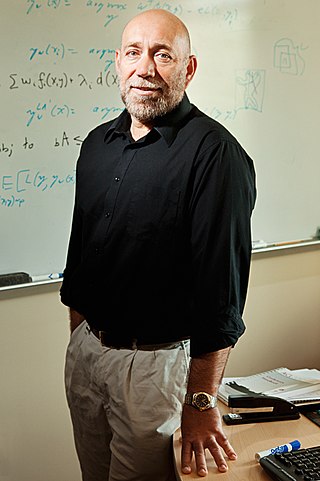Aravind Krishna Joshi was the Henry Salvatori Professor of Computer and Cognitive Science in the computer science department of the University of Pennsylvania. Joshi defined the tree-adjoining grammar formalism which is often used in computational linguistics and natural language processing.
James Frederick Allen is a computational linguist recognized for his contributions to temporal logic, in particular Allen's interval algebra. He is interested in knowledge representation, commonsense reasoning, and natural language understanding, believing that "deep language understanding can only currently be achieved by significant hand-engineering of semantically-rich formalisms coupled with statistical preferences". He is the John H. Dessaurer Professor of Computer Science at the University of Rochester

Karen Ida Boalth Spärck Jones was a self-taught programmer and a pioneering British computer scientist responsible for the concept of inverse document frequency (IDF), a technology that underlies most modern search engines. She was an advocate for women in the field of computer science. She even came up with a slogan: “Computing is too important to be left to men.” In 2019, The New York Times published her belated obituary in its series Overlooked, calling her "a pioneer of computer science for work combining statistics and linguistics, and an advocate for women in the field." From 2008, to recognize her achievements in the fields of information retrieval (IR) and natural language processing (NLP), the Karen Spärck Jones Award is awarded to a new recipient with outstanding research in one or both of her fields.
Dragomir R. Radev was an American computer scientist who was a professor at Yale University, working on natural language processing and information retrieval. He also served as a University of Michigan computer science professor and Columbia University computer science adjunct professor, as well as a Member of the Advisory Board of Lawyaw.
David Leigh Waltz was a computer scientist who made significant contributions in several areas of artificial intelligence, including constraint satisfaction, case-based reasoning and the application of massively parallel computation to AI problems. He held positions in academia and industry and at the time of his death, was a professor of Computer Science at Columbia University where he directed the Center for Computational Learning Systems.

Marti Hearst is a professor in the School of Information at the University of California, Berkeley. She did early work in corpus-based computational linguistics, including some of the first work in automating sentiment analysis, and word sense disambiguation. She invented an algorithm that became known as "Hearst patterns" which applies lexico-syntactic patterns to recognize hyponymy (ISA) relations with high accuracy in large text collections, including an early application of it to WordNet; this algorithm is widely used in commercial text mining applications including ontology learning. Hearst also developed early work in automatic segmentation of text into topical discourse boundaries, inventing a now well-known approach called TextTiling.
Judith L. Klavans is a linguist and computer scientist. She has been active in academia, industry and government in furthering the development and application of computational approaches to the study of language, with publications in areas including speech synthesis, machine translation, the development of resources and corpus analysis, internet addiction, information retrieval, and automatic summarization. Her technologies have been applied in fields ranging from medical informatics, cybersecurity, database interoperability, cultural heritage institutions and Digital Government.
Diane Litman is an American professor of computer science at the University of Pittsburgh. She also jointly holds the positions of senior scientist with the Learning Research and Development Center and faculty with the Intelligent Systems department. Litman is noted for her work in the areas of artificial intelligence, computational linguistics, knowledge representation and reasoning, natural language processing, and user modeling.

Barbara J. Grosz CorrFRSE is an American computer scientist and Higgins Professor of Natural Sciences at Harvard University. She has made seminal contributions to the fields of natural language processing and multi-agent systems. With Alison Simmons, she is co-founder of the Embedded EthiCS programme at Harvard, which embeds ethics lessons into computer science courses.
Julia Hirschberg is an American computer scientist noted for her research on computational linguistics and natural language processing.

Dan Roth is the Eduardo D. Glandt Distinguished Professor of Computer and Information Science at the University of Pennsylvania.

Pascale Fung (馮雁) is a professor in the Department of Electronic & Computer Engineering and the Department of Computer Science & Engineering at the Hong Kong University of Science & Technology(HKUST). She is the director of the newly established, multidisciplinary Centre for AI Research (CAiRE) at HKUST. She is an elected Fellow of the Institute of Electrical and Electronics Engineers (IEEE) for her “contributions to human-machine interactions”, an elected Fellow of the International Speech Communication Association for “fundamental contributions to the interdisciplinary area of spoken language human-machine interactions” and an elected Fellow of the Association for Computational Linguistics (ACL) for her “significant contributions toward statistical NLP, comparable corpora, and building intelligent systems that can understand and empathize with humans”.
Rada Mihalcea is a professor of computer science and engineering at the University of Michigan. Her research focuses on natural language processing, multimodal processing, and computational social science.
Regina Barzilay is an Israeli-American computer scientist. She is a professor at the Massachusetts Institute of Technology and a faculty lead for artificial intelligence at the MIT Jameel Clinic. Her research interests are in natural language processing and applications of deep learning to chemistry and oncology.
Lillian Lee is a computer scientist whose research involves natural language processing, sentiment analysis, and computational social science. She is a professor of computer science and information science at Cornell University, and co-editor-in-chief of the journal Transactions of the Association for Computational Linguistics.
Martha (Stone) Palmer is an American computer scientist. She is best known for her work on verb semantics, and for the creation of ontological resources such as PropBank and VerbNet.
Bonnie Jean Dorr is an American computer scientist specializing in natural language processing, machine translation, automatic summarization, social computing, and explainable artificial intelligence. She is a professor and director of the Natural Language Processing Research Laboratory in the Department of Computer & Information Science & Engineering at the University of Florida. Gainesville, Florida She is professor emerita of computer science and linguistics and former dean at the University of Maryland, College Park, former associate director at the Florida Institute for Human and Machine Cognition,, and former president of the Association for Computational Linguistics.
Yejin Choi is the Brett Helsel Professor of Computer Science at the University of Washington. Her research considers natural language processing and computer vision.
Ellen Riloff is an American computer scientist currently serving as a professor at the School of Computing at the University of Utah. Her research focuses on Natural Language Processing and Computational Linguistics, specifically information extraction, sentiment analysis, semantic class induction, and bootstrapping methods that learn from unannotated texts.
Ani Nenkova is Principal Scientist at Adobe Research, currently on leave from her position as an Associate Professor of Computer and Information Science at the University of Pennsylvania. Her research focuses on computational linguistics and artificial intelligence, with an emphasis on developing computational methods for analysis of text quality and style, discourse, affect recognition, and summarization.





